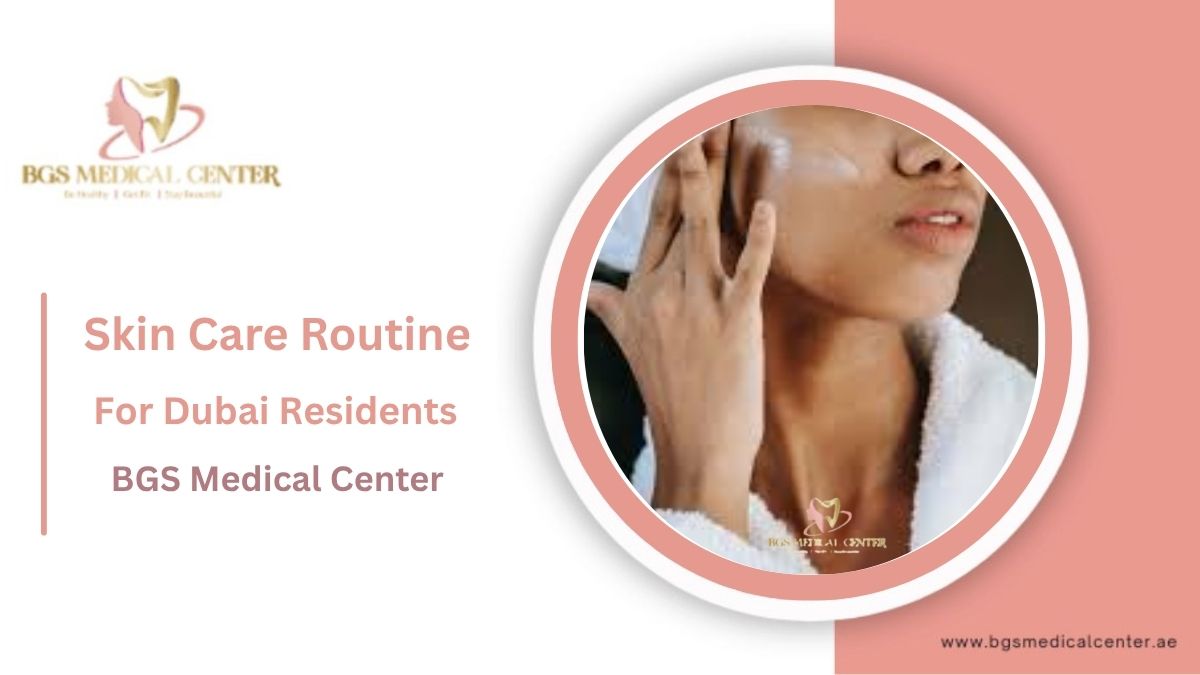Living in Dubai means your skin is constantly exposed to intense sunlight, humidity, and dry indoor air. Many residents notice their skincare products stop working the same way, what hydrates in winter might cause oiliness in summer.
But the truth is, your skin can stay balanced year-round with the right dermatologist-approved routine built specifically for the UAE’s climate. It’s not about using more products, it’s about using the right ones, in the right way.
In this 2025 guide, dermatologist Dr. Muhammad Hassan shares a practical skin care routine for Dubai residents, how to adapt it to heat and humidity, and what lifestyle habits prevent common issues like melasma and dryness in the region.
Why Dubai’s Climate Demands a Different Skin Care Routine
Dubai’s desert climate challenges the skin in ways most global skincare brands never consider. The combination of intense sunlight, low rainfall, and sudden humidity changes forces the skin to constantly adjust, often leading to dehydration, oil imbalance, and pigmentation.
Top 3 Environmental Stressors
- Sun Exposure: Accelerates aging and pigmentation.
- Air Conditioning: Dries and weakens the skin barrier.
- Humidity Fluctuations: Cause unpredictable oiliness or dryness.
This is why dermatologists recommend developing a climate-adapted skincare plan rather than relying on generic global trends. Our preventive skin care guide explains how your skin naturally adjusts to Dubai’s seasonal changes and how to maintain its balance year-round.
Morning Routine: Protection and Hydration
Morning is when your skin needs the most protection, from UV radiation, dust, and daily humidity changes. A dermatologist-approved morning routine should strengthen your barrier while keeping the skin fresh and hydrated.
Step 1: Gentle Cleanser
Choose a mild, sulfate-free cleanser that removes sweat and oil without stripping moisture.
- Gel or foam cleansers suit oily skin.
- Cream cleansers work better for dry or sensitive skin.
Step 2: Antioxidant Serum
Use Vitamin C or Niacinamide to fight sun damage and pollution.
This step helps prevent melasma and brightens your complexion.
Step 3: Moisturizer with SPF
A broad-spectrum SPF 50+ moisturizer is non-negotiable in Dubai.
Reapply every 2–3 hours if you’re outdoors to maintain protection.
💡 Pro Tip: Choose matte-finish sunscreens for humid months to avoid clogged pores.
Book your personalized skin care plan to identify which sunscreen and serums suit your skin best.
Evening Routine: Repair and Renewal
Evening care focuses on recovery, your skin repairs itself while you rest. After facing Dubai’s harsh heat and AC exposure all day, your routine should focus on soothing, hydrating, and supporting regeneration.
Step 1: Double Cleansing
Start with micellar water or a gentle oil cleanser, followed by your daily face wash to remove sunscreen, sweat, and dirt.
Step 2: Hydrating Toner or Mist
Use a pH-balancing toner with rose water or hyaluronic acid to refresh your skin after cleansing.
Step 3: Active Night Serum
Include dermatologist-approved actives such as:
- Retinol: For cell turnover and glow.
- Azelaic Acid: Prevents melasma and dullness.
- Ceramide serums: Strengthen the barrier overnight.
Step 4: Moisturizer or Overnight Mask
Seal hydration with a lightweight, non-comedogenic night cream.
“Your evening routine is where real healing happens, it’s when your skin renews,” says Dr. Mohammed Hassan, Specialist Dermatologist at BGS Medical Center.
Weekly Routine: Deep Cleansing and Maintenance
Weekly skincare acts like a reset button for your skin, especially important in Dubai’s climate, where sunscreen, sweat, and pollution can accumulate even with good hygiene.
Dermatologists recommend:
- Once a week: Gentle exfoliation with lactic or mandelic acid.
- Twice a month: Professional Hydrafacial or oxygen infusion treatments.
- Every 3 months: A preventive dermatology consultation to assess skin health.
These maintenance habits keep pores clear and skin radiant year-round. Visit our preventive dermatology services page to explore available clinical treatments.
How to Adjust Your Routine Across Dubai’s Seasons
Dubai may not have four traditional seasons, but skin still responds to changes in humidity and temperature. Adapting your skincare across the year helps avoid sudden dryness or oil imbalance.
| Season | Common Skin Concern | Dermatologist Tip |
|---|---|---|
| Summer (May–Sept) | Excess oil, clogged pores | Switch to gel-based moisturizers and reapply SPF frequently |
| Winter (Nov–Feb) | Dryness, irritation | Use richer creams and barrier-repair serums |
| Transitional Months (Mar–Apr, Oct) | Sensitivity, dullness | Add hydrating mists and gentle exfoliants |
A few small product swaps can make your routine effective all year.
Common Mistakes Dubai Residents Make with Skincare
Even with premium products, the most common skin issues come from daily habits rather than lack of care. Dermatologists frequently notice these mistakes among patients in Dubai:
- Using international routines not designed for hot climates.
- Over-exfoliating in an attempt to “control oil.”
- Skipping sunscreen indoors or in cars.
- Ignoring humidity’s impact on product absorption.
Each of these factors can weaken the skin barrier and raise the risk of melasma, particularly in regions with constant sun exposure. Our preventing melasma in sunny climate guide highlights effective strategies to protect your skin and maintain an even tone year-round.
FAQs
Q. Do I need different skincare for Dubai’s weather?
Yes. Dubai’s intense sunlight, humidity, and AC require customized care. A dermatologist can design a climate-specific skincare routine that fits your lifestyle.
Q. How many times a day should I wash my face?
Twice daily, once in the morning, once at night. Over-washing strips natural oils and worsens dryness.
Q. Is sunscreen really necessary indoors?
Yes. UV rays penetrate through windows and car glass, so daily SPF protection is essential.
Q. Can I use retinol in Dubai’s climate?
Yes, but under dermatologist guidance. Start slow and always apply SPF, as retinol increases sun sensitivity.
Q. What’s the best moisturizer for Dubai residents?
Look for lightweight, non-comedogenic creams with ceramides and hyaluronic acid, suitable for both humid and dry conditions.
Q. How often should I exfoliate in Dubai?
Once a week for oily or combination skin, every 10 days for dry skin. Avoid harsh scrubs and opt for dermatologist-approved chemical exfoliants.
Q. What should I do if my skin feels dull or tired?
Use antioxidant serums, maintain hydration, and schedule a skin rejuvenation facial every month to restore glow.
Conclusion
Healthy skin in Dubai is about adaptation, not excess. By following a structured, dermatologist-guided routine, you can maintain radiant, resilient skin regardless of the weather.
At BGS Medical Center, specialists design personalized skin care plans for Dubai residents, combining medical expertise with real-world climate understanding. For preventive and long-term results, explore our preventive dermatology services today.
Disclaimer
This content is for educational purposes only and does not replace medical advice. Always consult a DHA-licensed dermatologist for personalized recommendations.





